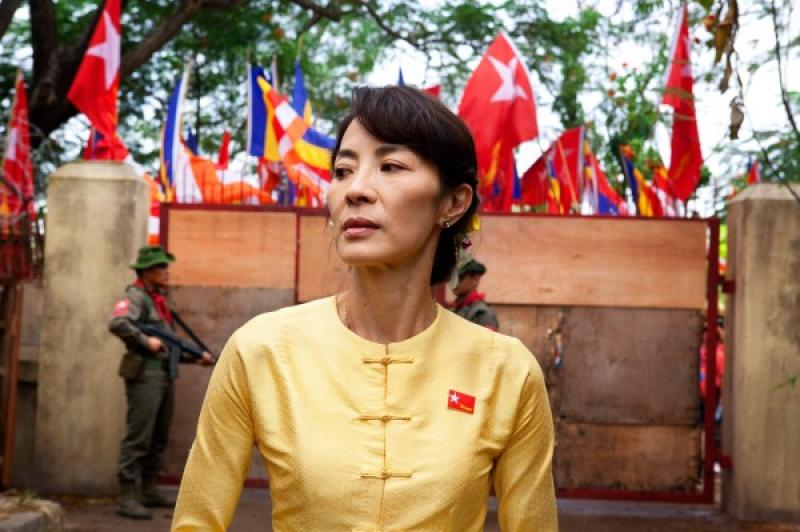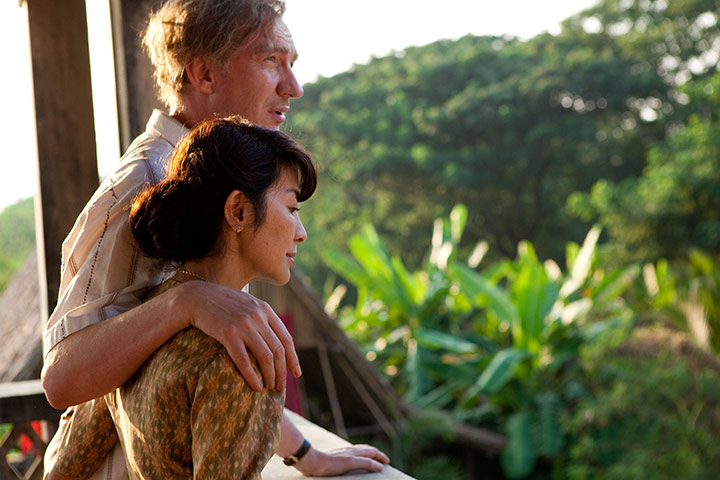The Lady | reviews, news & interviews
The Lady
The Lady
Biopic of Aung San Suu Kyi struggles with a script as wooden as vintage Burmese teak

Although now a major figure on the world stage, Aung San Suu Kyi began as a reluctant dissident and figure of protest against the military regime of her native Burma. Recent months have seen her finally released from house arrest and set to play a considerable role in the future politics of her benighted country. Such latest developments are beyond the scope of Luc Besson’s film The Lady.
Instead we see her path from Oxford housewife through to leadership of the National League for Democracy opposition party that won a huge victory in the 1990 elections, only for it to be overturned by the authorities. Suu Kyi would be locked away in her lakeside home for most of the next 20 years. That’s a strong narrative in itself, but it’s the human story of her relationship with her husband Michael Aris, their separation enforced by the cruelty of Burma’s regime right up until Aris’s death in 1999, that is most powerful.
 Unfortunately, the story itself is far stronger than Besson's film. Rebecca Frayn’s script has a distinctly wooden feel to it, and that doesn’t mean the quality of vintage Burmese teak. Michelle Yeoh as Suu Kyi does a valiant job struggling with clunking lines, and achieves a genuine presence at times; David Thewlis (pictured above right with Yeoh) is rather less successful as Aris, but still catches the character of a somewhat otherworldy academic whose family is caught up in a process that forces the couple to make a cruel choice. Had Suu Kyi agreed to leave Burma on her own accord, she would have been with her husband through to his death - she did not, fearing she would be denied readmission to the country; the alternative, which we see in the film, was contact only through brief and unreliable telephone calls.
Unfortunately, the story itself is far stronger than Besson's film. Rebecca Frayn’s script has a distinctly wooden feel to it, and that doesn’t mean the quality of vintage Burmese teak. Michelle Yeoh as Suu Kyi does a valiant job struggling with clunking lines, and achieves a genuine presence at times; David Thewlis (pictured above right with Yeoh) is rather less successful as Aris, but still catches the character of a somewhat otherworldy academic whose family is caught up in a process that forces the couple to make a cruel choice. Had Suu Kyi agreed to leave Burma on her own accord, she would have been with her husband through to his death - she did not, fearing she would be denied readmission to the country; the alternative, which we see in the film, was contact only through brief and unreliable telephone calls.
The rest of the cast – the generals in power, statesmen, diplomats, Oxford academics and an array of members of Burma’s opposition movement – looks even more thinly defined. The leading general, Ne Win, certainly had his eccentricities, making decisions based on tarot readings and numerology, but he’s reduced almost to parody (the phrase “pantomime dictator” comes to mind) and is surrounded by some pretty one-dimensional goons. A large street sign reading “British Embassy” may indicate where the next scene will be taking place but it’s all too indicative of a lowest-common-denominator style of explanation. Moments of emotion are directed rather than being allowed to evolve more organically.
It’s no doubt well-researched, but rarely has history ended up on screen more blandly
Flashbacks are prominent. We begin briefly with the assassination in 1947 of Suu Kyi’s father, Aung San, the hero of Burma’s liberation war with the British, before jumping into the refreshingly ordinary domestic jostle of family life in Oxford in the 1980s. Moving on through her return to look after her ailing mother in 1989, her subsequent growing involvement with the National League, her Nobel Prize for Peace in 1991, and subsequent events, it’s no doubt well-researched, but rarely has history ended up on screen more blandly.
Visually it looks good, especially the landscapes and exteriors shot in Thailand that stand in for Burma. The music seems heavy, dictating reactions rather than nurturing them. Yeoh is impressive, and at best keeps a moving simplicity in her portrayal of Suu Kyi (who had never spoken in public before 1989). If only Besson had approached The Lady with a conviction that less can sometimes speak stronger than more, its story might have had the impact that it deserves.
Watch the trailer for The Lady
The future of Arts Journalism
You can stop theartsdesk.com closing!
We urgently need financing to survive. Our fundraising drive has thus far raised £49,000 but we need to reach £100,000 or we will be forced to close. Please contribute here: https://gofund.me/c3f6033d
And if you can forward this information to anyone who might assist, we’d be grateful.

Subscribe to theartsdesk.com
Thank you for continuing to read our work on theartsdesk.com. For unlimited access to every article in its entirety, including our archive of more than 15,000 pieces, we're asking for £5 per month or £40 per year. We feel it's a very good deal, and hope you do too.
To take a subscription now simply click here.
And if you're looking for that extra gift for a friend or family member, why not treat them to a theartsdesk.com gift subscription?
more Film
 Can I get a Witness? review - time to die before you get old
Ann Marie Fleming directs Sandra Oh in dystopian fantasy that fails to ignite
Can I get a Witness? review - time to die before you get old
Ann Marie Fleming directs Sandra Oh in dystopian fantasy that fails to ignite
 Happyend review - the kids are never alright
In this futuristic blackboard jungle everything is a bit too manicured
Happyend review - the kids are never alright
In this futuristic blackboard jungle everything is a bit too manicured
 Robert Redford (1936-2025)
The star was more admired within the screen trade than by the critics
Robert Redford (1936-2025)
The star was more admired within the screen trade than by the critics
 Blu-ray: The Sons of Great Bear
DEFA's first 'Red Western': a revisionist take on colonial expansion
Blu-ray: The Sons of Great Bear
DEFA's first 'Red Western': a revisionist take on colonial expansion
 Spinal Tap II: The End Continues review - comedy rock band fails to revive past glories
Belated satirical sequel runs out of gas
Spinal Tap II: The End Continues review - comedy rock band fails to revive past glories
Belated satirical sequel runs out of gas
 Downton Abbey: The Grand Finale review - an attemptedly elegiac final chapter haunted by its past
Noel Coward is a welcome visitor to the insular world of the hit series
Downton Abbey: The Grand Finale review - an attemptedly elegiac final chapter haunted by its past
Noel Coward is a welcome visitor to the insular world of the hit series
 Islands review - sunshine noir serves an ace
Sam Riley is the holiday resort tennis pro in over his head
Islands review - sunshine noir serves an ace
Sam Riley is the holiday resort tennis pro in over his head
 theartsdesk Q&A: actor Sam Riley on playing a washed-up loner in the thriller 'Islands'
The actor discusses his love of self-destructive characters and the problem with fame
theartsdesk Q&A: actor Sam Riley on playing a washed-up loner in the thriller 'Islands'
The actor discusses his love of self-destructive characters and the problem with fame
 Honey Don’t! review - film noir in the bright sun
A Coen brother with a blood-simple gumshoe caper
Honey Don’t! review - film noir in the bright sun
A Coen brother with a blood-simple gumshoe caper
 The Courageous review - Ophélia Kolb excels as a single mother on the edge
Jasmin Gordon's directorial debut features strong performances but leaves too much unexplained
The Courageous review - Ophélia Kolb excels as a single mother on the edge
Jasmin Gordon's directorial debut features strong performances but leaves too much unexplained
 Blu-ray: The Graduate
Post #MeToo, can Mike Nichols' second feature still lay claim to Classic Film status?
Blu-ray: The Graduate
Post #MeToo, can Mike Nichols' second feature still lay claim to Classic Film status?

Add comment